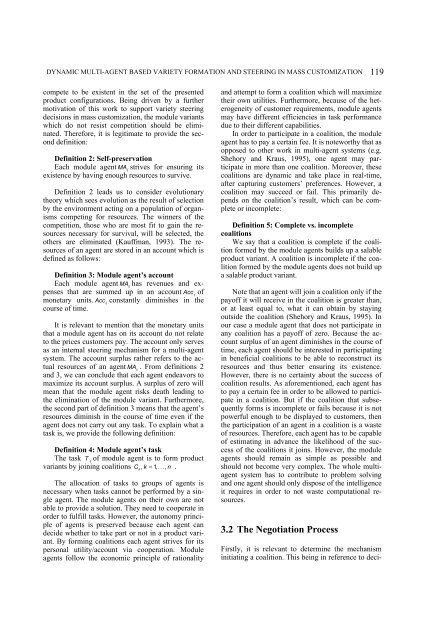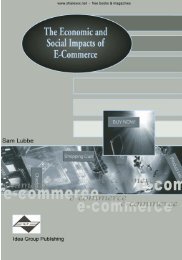Back Room Front Room 2
Back Room Front Room 2
Back Room Front Room 2
You also want an ePaper? Increase the reach of your titles
YUMPU automatically turns print PDFs into web optimized ePapers that Google loves.
DYNAMIC MULTI-AGENT BASED VARIETY FORMATION AND STEERING IN MASS CUSTOMIZATION<br />
compete to be existent in the set of the presented<br />
product configurations. Being driven by a further<br />
motivation of this work to support variety steering<br />
decisions in mass customization, the module variants<br />
which do not resist competition should be eliminated.<br />
Therefore, it is legitimate to provide the second<br />
definition:<br />
Definition 2: Self-preservation<br />
Each module agent MA strives for ensuring its<br />
ij<br />
existence by having enough resources to survive.<br />
Definition 2 leads us to consider evolutionary<br />
theory which sees evolution as the result of selection<br />
by the environment acting on a population of organisms<br />
competing for resources. The winners of the<br />
competition, those who are most fit to gain the resources<br />
necessary for survival, will be selected, the<br />
others are eliminated (Kauffman, 1993). The resources<br />
of an agent are stored in an account which is<br />
defined as follows:<br />
Definition 3: Module agent’s account<br />
Each module agent MA has revenues and ex-<br />
ij<br />
penses that are summed up in an account Acc of ij<br />
monetary units. Acc constantly diminishes in the<br />
ij<br />
course of time.<br />
It is relevant to mention that the monetary units<br />
that a module agent has on its account do not relate<br />
to the prices customers pay. The account only serves<br />
as an internal steering mechanism for a multi-agent<br />
system. The account surplus rather refers to the actual<br />
resources of an agent MA . From definitions 2<br />
ij<br />
and 3, we can conclude that each agent endeavors to<br />
maximize its account surplus. A surplus of zero will<br />
mean that the module agent risks death leading to<br />
the elimination of the module variant. Furthermore,<br />
the second part of definition 3 means that the agent’s<br />
resources diminish in the course of time even if the<br />
agent does not carry out any task. To explain what a<br />
task is, we provide the following definition:<br />
Definition 4: Module agent’s task<br />
The task T of module agent is to form product<br />
ij<br />
variants by joining coalitions Ck , k � 1,<br />
. . . , n .<br />
The allocation of tasks to groups of agents is<br />
necessary when tasks cannot be performed by a single<br />
agent. The module agents on their own are not<br />
able to provide a solution. They need to cooperate in<br />
order to fulfill tasks. However, the autonomy principle<br />
of agents is preserved because each agent can<br />
decide whether to take part or not in a product variant.<br />
By forming coalitions each agent strives for its<br />
personal utility/account via cooperation. Module<br />
agents follow the economic principle of rationality<br />
and attempt to form a coalition which will maximize<br />
their own utilities. Furthermore, because of the heterogeneity<br />
of customer requirements, module agents<br />
may have different efficiencies in task performance<br />
due to their different capabilities.<br />
In order to participate in a coalition, the module<br />
agent has to pay a certain fee. It is noteworthy that as<br />
opposed to other work in multi-agent systems (e.g.<br />
Shehory and Kraus, 1995), one agent may participate<br />
in more than one coalition. Moreover, these<br />
coalitions are dynamic and take place in real-time,<br />
after capturing customers’ preferences. However, a<br />
coalition may succeed or fail. This primarily depends<br />
on the coalition’s result, which can be complete<br />
or incomplete:<br />
Definition 5: Complete vs. incomplete<br />
coalitions<br />
We say that a coalition is complete if the coalition<br />
formed by the module agents builds up a salable<br />
product variant. A coalition is incomplete if the coalition<br />
formed by the module agents does not build up<br />
a salable product variant.<br />
Note that an agent will join a coalition only if the<br />
payoff it will receive in the coalition is greater than,<br />
or at least equal to, what it can obtain by staying<br />
outside the coalition (Shehory and Kraus, 1995). In<br />
our case a module agent that does not participate in<br />
any coalition has a payoff of zero. Because the account<br />
surplus of an agent diminishes in the course of<br />
time, each agent should be interested in participating<br />
in beneficial coalitions to be able to reconstruct its<br />
resources and thus better ensuring its existence.<br />
However, there is no certainty about the success of<br />
coalition results. As aforementioned, each agent has<br />
to pay a certain fee in order to be allowed to participate<br />
in a coalition. But if the coalition that subsequently<br />
forms is incomplete or fails because it is not<br />
powerful enough to be displayed to customers, then<br />
the participation of an agent in a coalition is a waste<br />
of resources. Therefore, each agent has to be capable<br />
of estimating in advance the likelihood of the success<br />
of the coalitions it joins. However, the module<br />
agents should remain as simple as possible and<br />
should not become very complex. The whole multiagent<br />
system has to contribute to problem solving<br />
and one agent should only dispose of the intelligence<br />
it requires in order to not waste computational resources.<br />
3.2 The Negotiation Process<br />
119<br />
Firstly, it is relevant to determine the mechanism<br />
initiating a coalition. This being in reference to deci-









